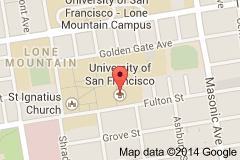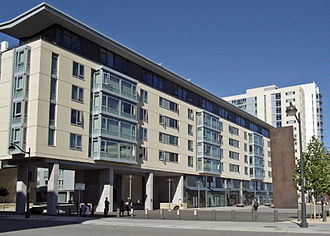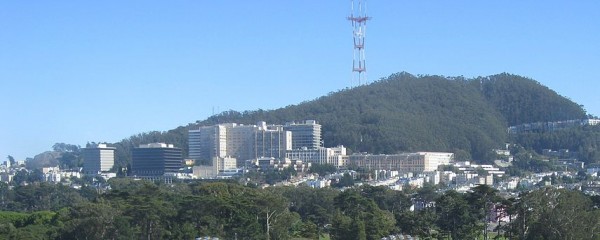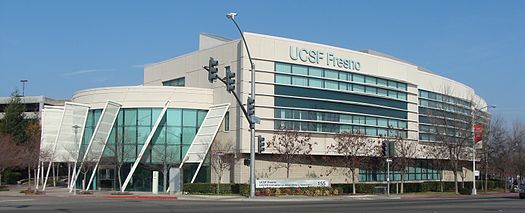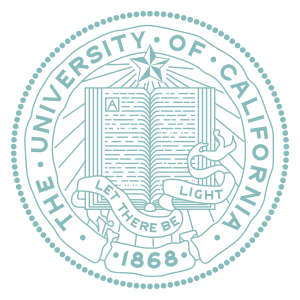
San Francisco, CA 94117, Top 100 Universities in USA 2014 – Rank – 82, University of California, San Francisco In California
San Francisco, CA 94117, Top 100 Universities in USA 2014 – Rank – 82, University of California, San Francisco In California
University of California, San Francisco
2130 Fulton Street San Francisco, CA 94117
The University of California, San Francisco (UCSF), is a center of health sciences research, patient care, and education; located inSan Francisco, California. UCSF is widely regarded as one of the world’s leading universities in health sciences. Though one of the 10 campuses of the University of California, it is unique for being the only University of California campus dedicated solely to graduate education, and in health and biomedical sciences. Some of UCSF’s treatment centers include kidney transplants and liver transplantation, radiology, neurosurgery, neurology, oncology,ophthalmology, gene therapy, women’s health, fetal surgery,pediatrics, and internal medicine.
Founded in 1873, the mission of UCSF is to serve as a “public university dedicated to saving lives and improving health.” The UCSF Medical Center is consistently[4] ranked among the top 10 hospitals in the United States by U.S. News & World Report,[5] who also ranked UCSF’s medical school as one of the top 10 in a number of specialties, including a specialty program in AIDS medical care ranked first in the country.[6]
UCSF is administered separately from Hastings College of Law, another UC institution located in San Francisco. In recent years, UCSF and UC Hastings have increased their collaboration, including the formation of the UCSF/Hastings Consortium on Law, Science, and Health Policy.
Distinctions
- First to discover that normal cellular genes can be converted to cancer genes (Nobel Prize in Medicine, J. Michael Bishop and Harold Varmus, 1989)
- First to discover (together with Stanford) the techniques of recombinant DNA, the seminal step in the creation of the biotechnology industry
- First to discover the precise recombinant DNA techniques that led to the creation of a hepatitis B vaccine
- First to perform a successful in-utero fetal surgery (Michael R. Harrison)
- First to clone an insulin gene into bacteria, leading to the mass production of recombinant human insulin to treat diabetes
- First to synthesize human growth hormone and clone into bacteria, setting the stage for genetically engineered human growth hormone
- First to develop prenatal tests for sickle cell anemia and thalassemia
- First to train pharmacists as drug therapy specialists
- First to establish special care units for AIDS patients and among the first to identify HIV as the causative agent of the disease
- First to discover prions, a unique type of infectious agent responsible for a variety of neurodegenerative diseases (Nobel Prize in Medicine, Stanley B. Prusiner, 1997)
- First to develop catheter ablation therapy for tachycardia, which cures “racing” hearts without surgery
- First university west of the Mississippi to offer a doctoral degree in nursing
- First to discover that missing pulmonary surfactants are the culprit in the death of newborns with respiratory distress syndrome; first to develop a synthetic substitute for it, reducing infant death rates significantly
- First to develop an academic hospitalist program (and coined the term “hospitalist”) (Robert M. Wachter); the field is the fastest growing specialty in modern medical history
- First high volume HIV counseling and testing program at the UCSF Alliance Health Project
- With a work force of 22,800 people and annual economic impact of $2 billion, UCSF is San Francisco’s second largest employer
- UCSF has its own fully functional police department, which carries out policing duties for its two major campuses as well as all satellite sites within the city and in South San Francisco.
- UCSF is home to the Legacy Tobacco Documents Library, an internationally recognized digital library of previously-secret internal tobacco industry documents. The Legacy Tobacco Documents Library (LTDL) contains more than 11 million documents created by major tobacco companies related to their advertising, manufacturing, marketing, sales, and scientific research activities.

